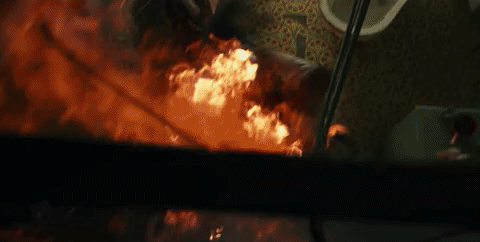Machine Gun Kelly has just popped a mysterious new drug that’s turned him into, basically, the Human Torch. With these great powers, there does not come great responsibility: MGK is in a decaying apartment complex in the heart of New Orleans trying to kill Jamie Foxx. The chase is quite thrilling and, ultimately, a race against time: These pyro powers will fade after five minutes. But, before they do, Jamie Foxx dunks Machine Gun Kelly’s head in a bathtub.

Admittedly, I didn’t have “Jamie Foxx fights Machine Gun Kelly with superpowers using bathtub water” on my 2020 Superhero Movie Bingo Card, but it’s been a weird year for the genre. Like the rest of the entertainment industry, many superhero blockbusters have been delayed due to the COVID-19 pandemic, meaning the likes of Black Widow and Wonder Woman 1984 have moved beyond their original release dates. (I won’t believe the always-delayed The New Mutants is a real movie until it actually comes out.)
But with the absence of superhero flicks from the Marvel or DC cinematic universes, Netflix has helped fill the void this summer—with mixed results. The streamer first gave us The Old Guard in July, a surprisingly thoughtful film about immortal warriors who have dealt with humanity’s self-destructive nature long enough to wonder whether we’re still worth saving. (The action scenes, courtesy of Love and Basketball director Gina Prince-Bythewood, also whip serious ass.) And now we have Project Power, a movie that peaks when Jamie Foxx fights Machine Gun Kelly with superpowers—make of that what you will.
The premise of Project Power feels like a sillier spin on Limitless: Rather than make its users super smart, “Power” is a new, experimental drug created by a mysterious government entity that is meant to turn humans into superheroes. The hope is, presumably, that having superheroes in the armed forces would turn the United States into a more literal global superpower. (This might be the dumbest villain motivation since Vincent D’Onofrio’s character in Jurassic World revealed that he wanted to turn velociraptors into military operatives.) There are also some vague mentions of evolving the human species, but I’m not sure how much being on fire would help somebody, say, bag groceries.
There are some other drawbacks to the Power pill: In its current form, the effects last for only five minutes, and a user won’t know what their ability is until they take one. While some of the powers are undeniably cool—again, Machine Gun Kelly, who plays a low-level dealer, turned into the Human Torch—some have potentially lethal drawbacks. For instance: If you overdose, you explode; not ideal. There is some rich material to work with here, especially once it’s made clear this shady government org is running trial and error by dispensing these pills to marginalized communities in American cities. But as a movie peaking with a bathtub-related brawl might suggest, Project Power ends up being a lot of wasted potential.
The film splits its time between three protagonists: Art (Foxx) is an ex-military man who’s searching for his missing daughter, whose disappearance has something to do with how Power is harvested; Robin (Dominique Fishback), a low-level dealer with aspirations to become a rapper who’s trying to pay for her mother’s diabetes medication; and Frank (Joseph Gordon-Levitt) a local detective who’s secretly taking the pills to better handle the wave of superpowered crime hitting the city. (Frank’s power is having indestructible skin; he gets up from a point-blank bullet to the temple.) Naturally, these three characters’ journeys will overlap, and they’ll team up to try to save Art’s daughter and get Power off the streets of New Orleans.
There are a couple of ways Project Power could’ve run with this premise—either by leaning into the superpower-induced chaos of New Orleans under siege, or by tackling some of the weightier ideas about how this would affect a city still reeling from the effects of Hurricane Katrina. On the one hand, you’d have a pretty mindless, but nevertheless entertaining, action movie; on the other, something more in line with the thoughtful sensibilities of The Old Guard. But Project Power can’t seem to decide what it wants to be, even from scene to scene. Power users getting blown up after cheesy one-liners give way to well-meaning but tonally jarring monologues about Henrietta Lacks and doctors using her tumor cells for research without consent.
A superhero movie with an identity crisis is a shame, particularly when it ruins an intriguing premise and an opportunity for Netflix to cement itself as a competitor to Marvel and DC. If The Old Guard represents one step forward, Project Power is two steps back: With its broad strokes and tired cop/superhero clichés, I don’t think “a more watchable version of David Ayer’s Bright” is something to strive for.
Directing duo Ariel Schulman and Henry Joost, leveling up from the documentary Catfish, a couple of Paranormal Activity sequels, and the underrated tech-thriller Nerve, do get to flex and stage some effective body horror. In one chilling sequence, a woman’s body turns to ice and begins falling apart; some pun intended. But the fact that Schulman and Joost excel when leaning into the scarier implications of Power perhaps underscores that their immediate future ought to lie back in horror. (Jason Blum should give them a call.)
More worrying is Project Power’s underwhelming script from Mattson Tomlin, who’s credited as the cowriter for the upcoming The Batman along with director Matt Reeves. Ideally, The Batman will inject new life into an iconic superhero—with Robert Pattinson as the new Caped Crusader, one should feel cautiously optimistic. (If you don’t know Pattinson’s excellent work outside of the Twilight franchise, that’s your problem.) But if Project Power serves as a preview of what we can expect Reeves to be working with, skepticism is reasonable. Tomlin’s boasts that The Batman will focus on Bruce Wayne’s trauma, as if every Batman story that didn’t star Adam West hasn’t tackled the character’s traumatic background, should put out a Bat Signal for concern.
Project Power also won’t be the last we’ll see of Schulman, Joost, and Tomlin working together. They have a Mega Man adaptation in the works with 20th Century Fox, while Tomlin is keeping busy selling other scripts to major studios and developing a series for Quibi. More power to them: Even the best directors and screenwriters can make a dud, and as far as failures go, Project Power doesn’t come close to the bottom of the Netflix barrel. (Believe me, I know.) But working within the blockbuster framework remains a double-edged sword: Greater fanfare comes with greater expectations. (For both The Batman, but also Mega Man, since Hollywood rarely gets video-game adaptations right.) A couple of more high-profile duds from this trio, though, would feel a little like watching the poor souls in Project Power blow themselves up for a five-minute superhero rush.
